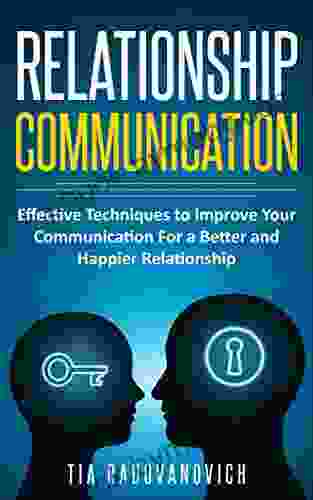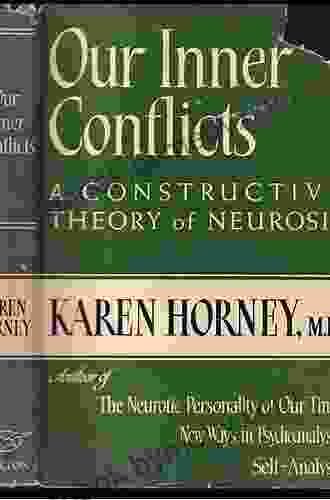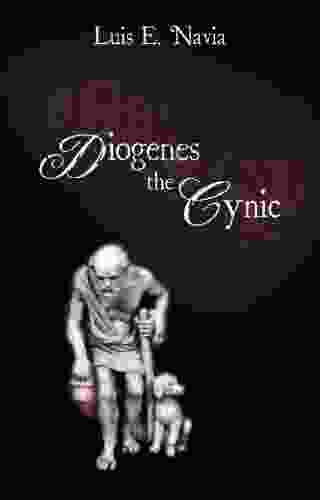Unveiling the Secrets of Our Inner Conflicts: A Comprehensive Guide to Constructive Theory of Neurosis

4.7 out of 5
| Language | : | English |
| File size | : | 1098 KB |
| Text-to-Speech | : | Enabled |
| Screen Reader | : | Supported |
| Enhanced typesetting | : | Enabled |
| Word Wise | : | Enabled |
| Print length | : | 254 pages |
: Unveiling the Labyrinth of Inner Conflicts
Within the intricate depths of our minds, a constant battle rages—a clash of desires, beliefs, and emotions that shape our thoughts, behaviors, and experiences. These inner conflicts, often hidden from plain sight, can become formidable obstacles on our path to self-discovery and fulfillment.
In his groundbreaking work, "Our Inner Conflicts: Constructive Theory of Neurosis," renowned psychiatrist Dr. Karen Horney embarked on an extraordinary journey to unravel the complexities of these internal battles. Through meticulous clinical observations and a profound understanding of human nature, she developed a revolutionary theory that has transformed our understanding of mental health and personal growth.
The Constructive Theory of Neurosis: A Paradigm Shift
Dr. Horney's groundbreaking theory challenges traditional perspectives on neurosis, reframing it not as a pathological condition but rather as a coping mechanism—an albeit misguided attempt by the individual to navigate the challenges of life.
According to Horney, inner conflicts arise from a fundamental anxiety known as "basic anxiety." This anxiety stems from a perceived lack of safety, love, and belonging within the early family environment. Faced with this anxiety, individuals develop three protective strategies, known as "neurotic trends."
These neurotic trends—moving toward people, moving against people, and moving away from people—manifest as patterns of behavior and personality traits that play out in our relationships, our careers, and our overall well-being.
Moving Toward People: Craving Love and Acceptance
Individuals who move toward people are driven by an intense need for love, approval, and belonging. They often exhibit submissive and dependent behaviors, putting the needs of others above their own. Their fear of isolation and rejection fuels their constant pursuit of validation.
While this strategy may initially provide a sense of security, it can lead to a pattern of self-sacrifice and a lack of personal boundaries. It can also create a dependency on external sources of self-worth, leaving the individual vulnerable to manipulation and exploitation.
Moving Against People: Dominating and Controlling
In contrast to those who move toward people, individuals who move against people are driven by a desire for power, control, and dominance. They often exhibit aggressive and hostile behaviors, seeking to assert their superiority over others.
While this strategy may provide a sense of strength and invincibility, it can lead to isolation and relationship difficulties. Others may perceive the individual as untrustworthy and manipulative, creating a barrier to genuine connections.
Moving Away from People: Seeking Independence and Autonomy
Individuals who move away from people are characterized by a strong need for independence and self-reliance. They often withdraw from social situations, preferring to spend time alone or pursuing solitary activities.
While this strategy may offer a sense of freedom and autonomy, it can also lead to feelings of loneliness and isolation. The individual may struggle to form meaningful relationships and experience a lack of emotional support.
Resolving Inner Conflicts: A Path to Personal Growth
The Constructive Theory of Neurosis provides a roadmap for understanding and resolving our inner conflicts. Dr. Horney believed that by gaining insight into our neurotic trends, we can break free from their limiting patterns and move toward self-actualization.
This journey of self-discovery involves:
- Becoming aware of our neurotic strategies
- Understanding their underlying motivations
- Developing healthier coping mechanisms
- Finding a balance between our needs and the needs of others
: Embracing the Power of Inner Harmony
"Our Inner Conflicts: Constructive Theory of Neurosis" is a profound guide to the complex landscape of human psychology. Dr. Karen Horney's revolutionary theory not only sheds light on the nature of inner conflicts but also empowers us with the tools to navigate them with wisdom and compassion.
By understanding and resolving our inner conflicts, we unlock our potential for personal growth, resilience, and well-being. We learn to embrace our vulnerability, build authentic relationships, and live a life aligned with our true selves.
Embracing the transformative power of "Our Inner Conflicts," we embark on a journey of self-discovery that leads to inner harmony and a profound sense of fulfillment.
4.7 out of 5
| Language | : | English |
| File size | : | 1098 KB |
| Text-to-Speech | : | Enabled |
| Screen Reader | : | Supported |
| Enhanced typesetting | : | Enabled |
| Word Wise | : | Enabled |
| Print length | : | 254 pages |
Do you want to contribute by writing guest posts on this blog?
Please contact us and send us a resume of previous articles that you have written.
 Book
Book Novel
Novel Page
Page Chapter
Chapter Text
Text Story
Story Genre
Genre Reader
Reader Library
Library Paperback
Paperback E-book
E-book Magazine
Magazine Newspaper
Newspaper Paragraph
Paragraph Sentence
Sentence Bookmark
Bookmark Shelf
Shelf Glossary
Glossary Bibliography
Bibliography Foreword
Foreword Preface
Preface Synopsis
Synopsis Annotation
Annotation Footnote
Footnote Manuscript
Manuscript Scroll
Scroll Codex
Codex Tome
Tome Bestseller
Bestseller Classics
Classics Library card
Library card Narrative
Narrative Biography
Biography Autobiography
Autobiography Memoir
Memoir Reference
Reference Encyclopedia
Encyclopedia Samuel Bridgewater
Samuel Bridgewater Karyn Siegel Maier
Karyn Siegel Maier Karan Gupta
Karan Gupta Phil Emmert
Phil Emmert Laura Bogen
Laura Bogen Justin Monroe
Justin Monroe Susan Zimmermann
Susan Zimmermann Shea Fontana
Shea Fontana Neveen Musa
Neveen Musa Jung Yun
Jung Yun K Connie Kang
K Connie Kang Nikki Grahame
Nikki Grahame Richard A Ferri
Richard A Ferri Kardas Publishing
Kardas Publishing Ross Mccluney
Ross Mccluney Sam Mahmud
Sam Mahmud Ken Cook
Ken Cook Thomas Sowell
Thomas Sowell Victor Silvester
Victor Silvester Richard Meadows
Richard Meadows
Light bulbAdvertise smarter! Our strategic ad space ensures maximum exposure. Reserve your spot today!

 Hayden MitchellThe Barefoot Woman: A Haunting Tale of Survival and Healing from the Rwandan...
Hayden MitchellThe Barefoot Woman: A Haunting Tale of Survival and Healing from the Rwandan... Miguel NelsonFollow ·9.9k
Miguel NelsonFollow ·9.9k Ernest PowellFollow ·17.7k
Ernest PowellFollow ·17.7k Art MitchellFollow ·8.5k
Art MitchellFollow ·8.5k Edwin BlairFollow ·11.2k
Edwin BlairFollow ·11.2k Will WardFollow ·19k
Will WardFollow ·19k Carlos DrummondFollow ·17.7k
Carlos DrummondFollow ·17.7k Sidney CoxFollow ·9.7k
Sidney CoxFollow ·9.7k Jaime MitchellFollow ·2k
Jaime MitchellFollow ·2k

 George Orwell
George OrwellPandemic with Dogs: Two Essays
By Susannah Charleson In the midst of...

 Leo Mitchell
Leo MitchellAdam Smith's The Wealth of Nations: A Classic Treatise on...
Adam Smith's The...

 Cade Simmons
Cade SimmonsUnlock Your Communication Potential: Effective Techniques...
Communication is a fundamental...

 Floyd Richardson
Floyd RichardsonFire and Ashes: Success and Failure in Politics
Fire and Ashes: Success and...

 Oliver Foster
Oliver FosterUnlock the Enchanting Mystery of Ken Follett's "The Key...
Embark on a captivating literary journey into...
4.7 out of 5
| Language | : | English |
| File size | : | 1098 KB |
| Text-to-Speech | : | Enabled |
| Screen Reader | : | Supported |
| Enhanced typesetting | : | Enabled |
| Word Wise | : | Enabled |
| Print length | : | 254 pages |












